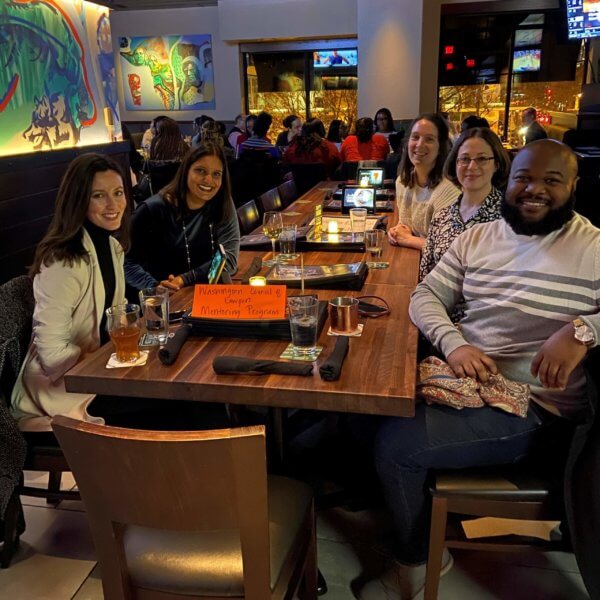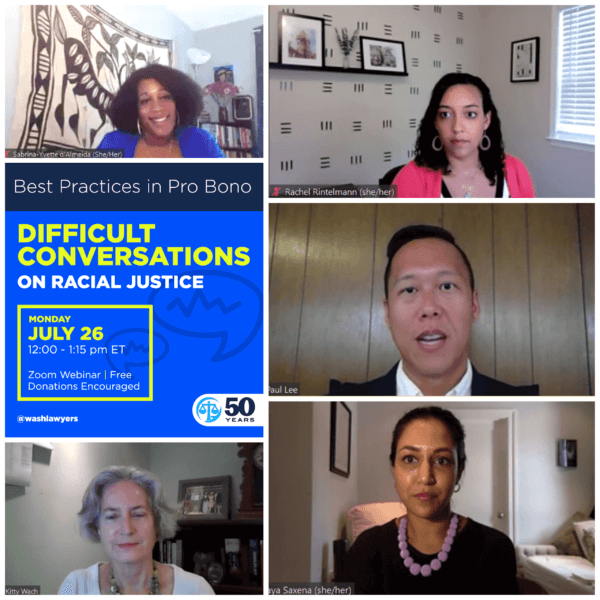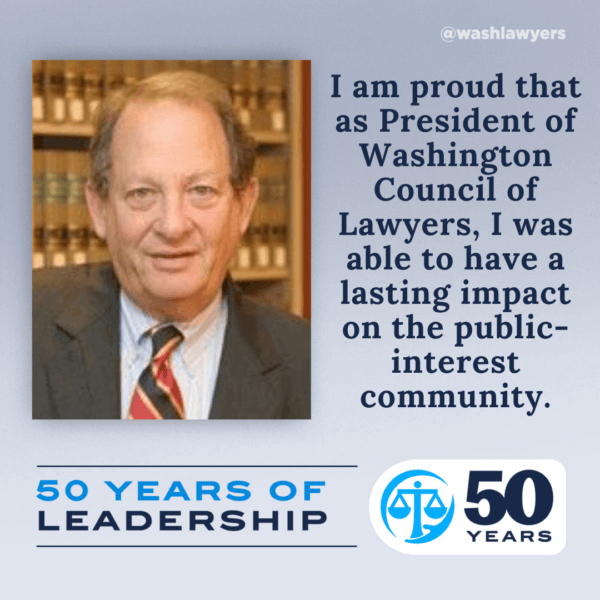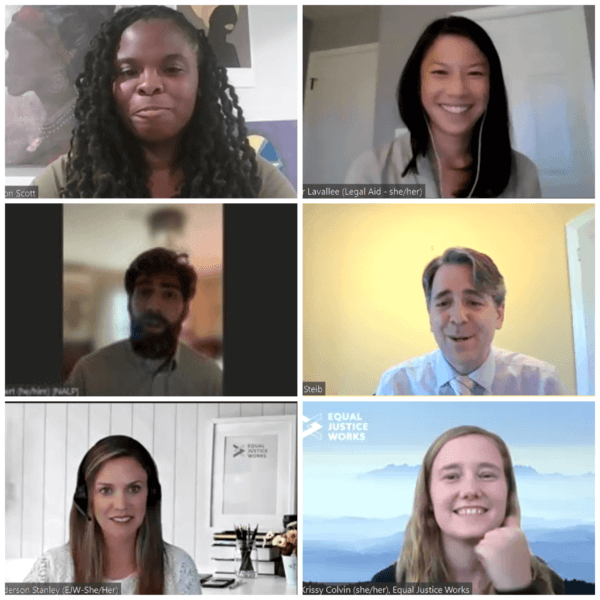
Lead Our Team: Seeking our Next Executive Director
09 September 2021 Blog, Featured
Washington Council of Lawyers is seeking a strong and driven leader to serve as its next Executive Director. The Executive Director’s primary duty is to advance the mission of Washington Council of Lawyers, as reflected in our Mission Statement: We are a voluntary bar association committed to ensuring that our legal system treats everyone fairly, regardless of money, position, or power. Our members represent the legal community’s diversity: They come from law firms, law schools, private and nonprofit organizations, and the government. We promote pro bono and public-interest law—by building partnerships among the public, private, and nonprofit sectors; volunteering to provide legal services to those who need them; training and mentoring the next generation of public-interest advocates; and supporting policies that expand access to justice. The Executive Director is our key management leader and reports to the Board of Directors. Specifically, the Executive Director is responsible for leading our organization in: Achieving its mission/furthering its reputation by offering outstanding programs, training sessions, advocacy, mentoring, and community-building opportunities with our working Board Communicating with and supporting our Board of Directors and committees Communicating with our members and external outreach, through inter alia, our website and social media platforms Executing fundraising initiatives Working with Board members on the annual budget and financial reporting Supervising and managing two staff members Engaging in relevant advocacy before the DC government and other authorities, and Helping to ensure legal compliance Qualifications and Desired Experience: JD preferred Two or more years of non-profit management experience Ability to set agendas, advance the organization’s mission, and build a strong team of board and staff members Familiarity with budgeting, strategic planning, and nonprofit management Detail-oriented, well-organized, and able to work independently Strong time and task management skills Strong communications and interpersonal skills A strong commitment to our mission and to professionalism Basic knowledge of, or ability to learn, Microsoft Office including Word and Excel; Google platforms including Google Docs, Google Sheets, Google Forms, Google Drive; and WordPress Familiarity with Wild Apricot membership software and WordPress or similar database and website software is a plus Familiarity with social media platforms such as Twitter, Instagram, Facebook, and LinkedIn and Hootsuite social media software Notes: (1) This job includes occasional transport of supplies and materials to events, etc.; reasonable accommodations will be made if the candidate is unable to perform such functions; (2) This is not intended to be an exhaustive list of key job functions, and job duties may change over time based on organizational needs. Hours and Compensation: The Executive Director position is part-time, averaging at least 30 hours per week; he/she/they manage their own time and hours with availability generally required during regular business hours. Working from home and telecommuting is part of how we work. Occasional evening work is required to assist with evening programs. We are willing to explore moving to a full-time position at a later date. The salary range for this position, on a part-time basis, is $60,000 to $75,000. A broader package of benefits is currently being considered for this position. Washington Council of Lawyers is an equal opportunity employer and does not discriminate on the basis of sex, race, color, ethnicity, national origin, sexual orientation, gender identity, age, disability status, or any applicable characteristics protected by law. How to Apply: Interested persons are encouraged to apply immediately and should submit a letter of interest and resume in one PDF document to jobs@wclawyers.org, with “[Full Name] – Executive Director” as the subject of the email. Applications will be reviewed as they are submitted. The position remains open until filled.

Advance Your Career Through Mentoring
02 September 2021 Blog, Featured
Washington Council of Lawyers is celebrating its 50th Anniversary this year, and throughout these celebrations, we’ve reminisced about our many success stories. The Mentoring Program is one of these successes. Throughout the years, the Mentoring Program has fostered one-on-one mentoring relationships, hosted various networking events and training sessions, and brought together our public-interest community in a unique way. The Mentoring Program positively impacts many members’ experience with Washington Council of Lawyers, and both mentors and mentees love remembering the programs’ past and looking forward to the program’s future. Multiple leaders of the program throughout the years shared some of their fondest memories of this incredible program.

You Have A Place Here
All practicing lawyers in Washington, DC share an ethical commitment to offer free or reduced-fee legal services to the many people in our community who are denied justice or otherwise marginalized by the inability to afford good counsel. This service commitment applies across all practice areas and includes lawyers in private practice, in government, in non-profits, in academia, in associations, and those working for our city’s many strong legal services providers. In this sense, Washington Council of Lawyers has a much broader constituency than other voluntary bar associations. So, whether you practice corporate law or criminal law, trade law or family law, whether you regularly litigate in DC courts or have never seen the inside of a courtroom, and whether you are a solo practitioner or work for an organization with hundreds of employees, you have a professional home with us.

Welcome our New Board Members!
We are excited to welcome five new board members to our Board of Directors. Read on to find out more about these fantastic advocates.

Meet Our New Honorary Board Members
We are thrilled to welcome three new members to our Honorary Board. Each of these prominent advocates has a deep commitment to pro bono service and public-interest law. We’re excited to be able to learn from their experiences.

Nominations now open for our 2021 Legal Services and Government Pro Bono Awards!
We are now accepting nominations for our 2021 Legal Services Award and Government Pro Bono Award. Each year at our Awards Ceremony, we recognize the extraordinary work of some of the District’s most dedicated public-interest and government pro bono lawyers. Our 2021 Awards Ceremony will take place on Thursday, December 2. Our Legal Services Award recognizes a dynamic legal-services lawyer who represents low-income clients, works to improve access to justice, or thinks creatively to solve difficult legal problems. Our Government Pro Bono Award commends a dedicated government lawyer who also volunteers time to organize pro bono efforts or represent low-income clients. Nomination materials are due by 5 pm ET on Monday, October 4, 2021. The awards criteria and nomination instructions are below. Legal Services Award Our Legal Services Award recognizes the work of lawyers who serve in the public interest community: the staff attorneys who provide outstanding representation to low-income individuals day in and day out. These may be rising stars or unsung heroes – but they demonstrate a passion for helping people and a hunger for increasing access to justice. We’re looking for nominees with one or more of the following characteristics: An advocate who has not previously been widely, publicly recognized for her or his work and whose work benefits low-income or otherwise marginalized clients in the Greater DC Metro Region; An individual who supports the DC public-interest community in improving the access to justice for those who cannot afford an attorney; An advocate who has endeavored to bring together the public-interest, pro bono, and government legal communities to improve the quality and availability of free legal services for those in need; and Someone who has gone above and beyond the normal requirements of their job to assist persons in need or has demonstrated outside-the-box thinking about how to resolve difficult legal issues. Past Winners: 2020 Allison Miles-Lee, Bread for the City 2019 Tricia Monroe, The Legal Aid Society for the District of Columbia 2018 Lindsy Miles-Hare, Ayuda 2017 Tracy Goodman, Children’s Law Center 2016: Thomas “Skip” Mark, D.C. Bar Pro Bono Center 2015: Rebecca Lindhurst, Bread for the City 2014: Jodi Feldman, The Legal Aid Society for the District of Columbia Government Pro Bono Award The Government Pro Bono Award highlights the important (and often overlooked) pro bono contributions made by government lawyers. Pro bono service can take many forms and is not limited to direct legal representation or litigation. Past recipients have promoted access to justice in a variety of ways and in many different substantive practice areas. The Government Pro Bono Award recipient will be a government attorney who has made significant pro bono contributions. The pro bono work performed may include, but is not limited to activities such as: Involvement in establishing or implementing an agency pro bono program; Increasing the level of pro bono service by agency attorneys through promotion or facilitation of pro bono opportunities; Mentoring or training agency lawyers handling pro bono matters, litigating cases or providing non-litigation legal services to low income people or entities; or Participating regularly in pro bono clinics. Please note that the above lists of pro bono activities are not exhaustive. We gladly will consider nominations of attorneys who have performed other kinds of pro bono service. Past Winners: 2020: Jo Bahn, Federal Deposit Insurance Corporation 2019 Marissa Schnaith, U.S. Department of Labor 2018 Catalina Martinez, U.S. Small Business Administration 2017 Deborah Birnbaum, U.S. Department of Labor 2016 Katrina Rouse, Antitrust Division, U.S. Department of Justice 2015 Kathryn Legomsky, U.S. Department of Housing & Urban Development 2014 John Bowers, Civil Division, U.S. Department of Justice 2013 Jay Owen, Antitrust Division, U.S. Department of Justice 2012 Edward Eliasberg, Antitrust Division, U.S. Department of Justice 2011 Karen Shrimp, U.S. Securities and Exchange Commission 2010 John Warshawsky, Civil Division, U.S. Department of Justice 2009 Sean Keveney, Civil Rights Division, U.S. Department of Justice 2008 Paul Kendall, Federal Bureau of Prisons, U.S. Department of Justice 2007 James Yoon, Antitrust Division, U.S. Department of Justice 2006 Mark Pletcher, Antitrust Division, U.S. Department of Justice 2005 Julie Abbate, Civil Rights Division, U.S. Department of Justice 2004 Laura Klein, Pro Bono Program, U.S. Department of Justice 2003 Claire McGuire, Federal Deposit Insurance Corporation & Department of Treasury Nomination Instructions Nominations should describe the nominee’s relevant professional activities, including (1) a description of the legal services and/or other efforts upon which the nomination is based, (2) an explanation of the impact of that work on clients, other advocates, and/or others and (3) the time period covered by the activities. Nomination materials should be no longer than 6 pages in length, including the nomination, resume, and any other supporting documents, such as letters of recommendation. Nomination materials should be submitted to info@wclaywers.org. If you have any questions, please contact Nancy Lopez at 202.942.5063. Deadline All nominations must be received by 5:00 pm ET on Monday, October 4. Learn more about the Awards Ceremony and past award winners.

Best Practices in Pro Bono: Difficult Conversations on Racial Justice
The racial justice reckoning that began last year set the stage for many crucial, yet difficult, conversations about how we move forward toward a just and equitable society. On Monday, July 26th, we continued this important discussion through our Best Practices in Pro Bono Series virtual panel event.

50 Years of Leadership: Past President Marc Efron
Marc Efron, part of the group of progressive Washington, DC attorneys who founded Washington Council of Lawyers, was the second board president. Marc shared this background and memories from his tenure as board president.

2021 Fellowships 101 Resources
Annually, Washington Council of Lawyers hosts Fellowships 101, where law students and aspiring public-interest lawyers learn about the fellowship process and receive concrete tips for creating a successful fellowship application. This year’s event was virtual, but our expert panelists made the experience interactive and helpful. This summary also includes additional resources and important dates and links.






